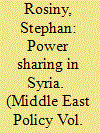| Srl | Item |
| 1 |
ID:
126051


|
|
|
| 2 |
ID:
143542


|
|
|
|
|
| Summary/Abstract |
Most countries of the Arab Mashrek are multi-ethnic and multi-sectarian. In recent years, most of them have experienced violent clashes between groups that frame their conflicts along ethnic-sectarian lines. This article investigates the Lebanese Ta’if Agreement of 1989 as a crucial case study of how to manage such conflicts through a transitory power-sharing arrangement. It presents several provisions of this agreement that adhere to three different approaches of how to deal with such conflicts: the consociational and the centripetal models of power-sharing as well as the integrationist paradigm. It thereby seeks to develop a theoretical argument about chances and risks of transitory power-sharing in deeply divided societies and derives some general lessons for managing conflicts in the Middle East.
|
|
|
|
|
|
|
|
|
|
|
|
|
|
|
|
| 3 |
ID:
142166


|
|
|
|
|
| Summary/Abstract |
At the end of 2014, some unexpected news about the “Islamic State” (IS) made headlines: al-Quds al-Arabi reported that a newly created IS military-police department in Raqqa had arrested fighters who had refused to go to battle in Kobani,1 and the Financial Times reported the execution of 100 foreign fighters and the arrest of another 400 trying to flee the war zone.2 Spoiled by its initial success, IS has now suffered some serious military setbacks in Baiji, Sinjar, Kobani, Tikrit and other towns in Iraq and Syria. In this article, I argue that these events are signs of the decline of an organization that has passed the zenith of its power. IS has overreached politically, militarily, and ideologically by proclaiming the renaissance of the Islamic caliphate, by declaring a territorial state to be the nucleus of an eschatological and universal Islamic empire, and by denouncing everybody who does not follow its extremist religious doctrine as an apostate. The loss of territory and centralized command, however, will most probably not mark the group's end; rather it will cause IS to resort to a strategy of terrorist warfare — as it has already done in some attacks in Western capitals — and will lead to its metastasis into countries like Libya, Yemen, Algeria, Pakistan and Egypt.
|
|
|
|
|
|
|
|
|
|
|
|
|
|
|
|